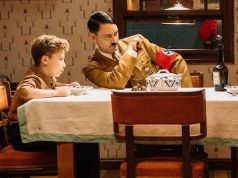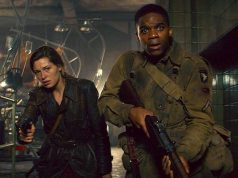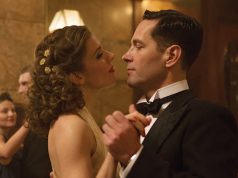A three-hour movie featuring a fictional love triangle set against a historic tragedy in which the action scenes are far better than the romance scenes. Yes, “Titanic” was a good movie. But we’re talking about “Pearl Harbor,” which is a great deal better.
The film is easily divided into two halves: The mediocre half and the excellent half. The mediocre one comes first, unfortunately, as for the first 90 minutes a sterile, perfunctory romance is established between Army flyer Rafe McCawley (Ben Affleck) and nurse Evelyn Johnson (Kate Beckinsale).
It’s early 1941, when the rest of the world is at war and America is still doing the Lindy hop. Eager to fight, Rafe join the Eagle Squadron, a British flying force of otherwise-unneeded American pilots. When he’s shot down over the Atlantic, Evelyn mourns herself right into the arms of Rafe’s best friend Danny Walker (Josh Hartnett). They’ve both finally found some peace after Rafe’s death and are stationed at paradisiacal Pearl Harbor when Rafe shows up, quite not-dead indeed. (The movie cheated, by the way, in telling us Rafe was dead but failing to mention no body had been found.)
Just as the romantic triangle is hitting the fan, and Rafe and Danny are hitting each other, the Japanese — or “Japs,” as we called them in those days — bomb the crud out of Pearl Harbor.
Thus begins the excellent half of the movie, which commences with a 30-minute attack sequence that is ungruesome — no severed limbs or gushing blood — and yet terrifyingly realistic. Director Michael Bay, who has directed his share of loud, senseless piffle (“Armageddon” and “The Rock,” specifically), delivers the goods this time. His long tracking shots that follow the bombs as they drop from the planes are more than just cool gimmicks. They’re exhilarating moments that bear the mark of near-genius. We’re not just there in the middle of the war; we’re sitting on the bombs like Slim Pickens in “Dr. Strangelove.”
The love triangle takes a backseat to the war, but rest assured that when it resurfaces, it’s as melodramatic as ever. Screenwriter Randall Wallace (who also wrote “Braveheart”; brevity apparently is not his strong suit) at this point switches from romantic-drama cliches to war-movie cliches. (A main character, injured on the battlefield, actually says, “I’m not gonna make it!”; the “Go on without me!” is implied.)
The aforementioned mediocre half of the film is essentially a series of sentimental skits — Rafe and Evelyn sneak onto a boat for fun! Danny and Evelyn go joyriding in a plane! — designed to make teen-age girls’ hearts flutter. (Imagine “Titanic” if Kate’s weaselly fiance and Jack had BOTH been adorable.) It’s an epic-scale film without the characters to back it up, a movie that knows it needs to be long and sprawling but that forgot to come up with anything new in terms of stories or people. (For 90 minutes, I kept thinking, “OK, enough exposition. Where are the bombs?”)
In the end, however, there is a powerful tide of emotions, thanks to the jingoism, noble friendships and proud war victories. Though Jon Voight wears the most absurdly fake prosthetic chin as Franklin D. Roosevelt, he exudes a certain dignity in the role. And while Affleck and Hartnett flounder in the shallow end trying to spark chemistry with Beckinsale without good dialogue to help them, their relationship to each other actually does work. We believe them as life-long friends, and their devotion to each other in spite of personal grievances is inspiring.
It is rare that a movie lives up to its hype, and this one doesn’t. It features Cuba Gooding Jr. in a role that could literally be cut altogether from the film without affecting it one bit. It assumes viewers will care about the love triangle without giving them much reason to. But when it is good, it is spectacular. When it’s over, the positive feelings have outweighed the negative ones, and “Pearl Harbor” will go down as a success.
B+ (3 hrs., 4 min.; )





